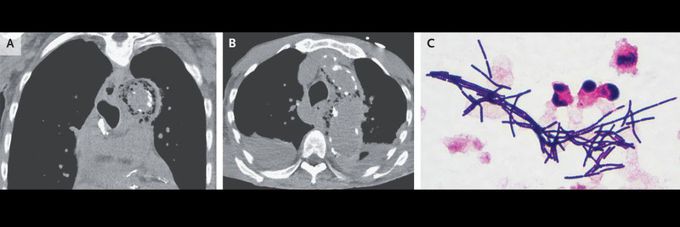


Emphysematous Aortitis
A 74-year-old man with a history of end-stage kidney disease and coronary artery disease, as well as a 3-day history of anorexia and generalized weakness, was brought to the emergency department for evaluation of decreased responsiveness during hemodialysis. On examination, he appeared ill and provided only brief responses to questions. A chest radiograph showed a widened mediastinum. Computed tomography of the chest, performed without the administration of intravenous contrast material, showed intramural gas in the ascending and descending aorta and aortic calcifications (Panels A and B). Gram’s staining of samples obtained from anaerobic blood cultures showed gram-positive rods (Panel C), and there was subsequent growth of Clostridium septicum. A diagnosis of infectious emphysematous aortitis was made. C. septicum infection is strongly associated with gastrointestinal cancer. The organism is thought to enter the bloodstream from the gastrointestinal tract; in cases of endovascular infection, such as that seen in this patient, it seeds atherosclerotic plaques. Three years before the current presentation, the patient had positive results on fecal immunohistochemical testing, but he declined colonoscopy. Abdominal imaging performed during the current hospitalization showed no overt signs of cancer. Intravenous penicillin G and clindamycin were administered. Although surgery is considered to be the definitive treatment for this type of infection, the level of risk was determined to be unacceptable in this case. The patient died on hospital day 7 while receiving comfort care.

